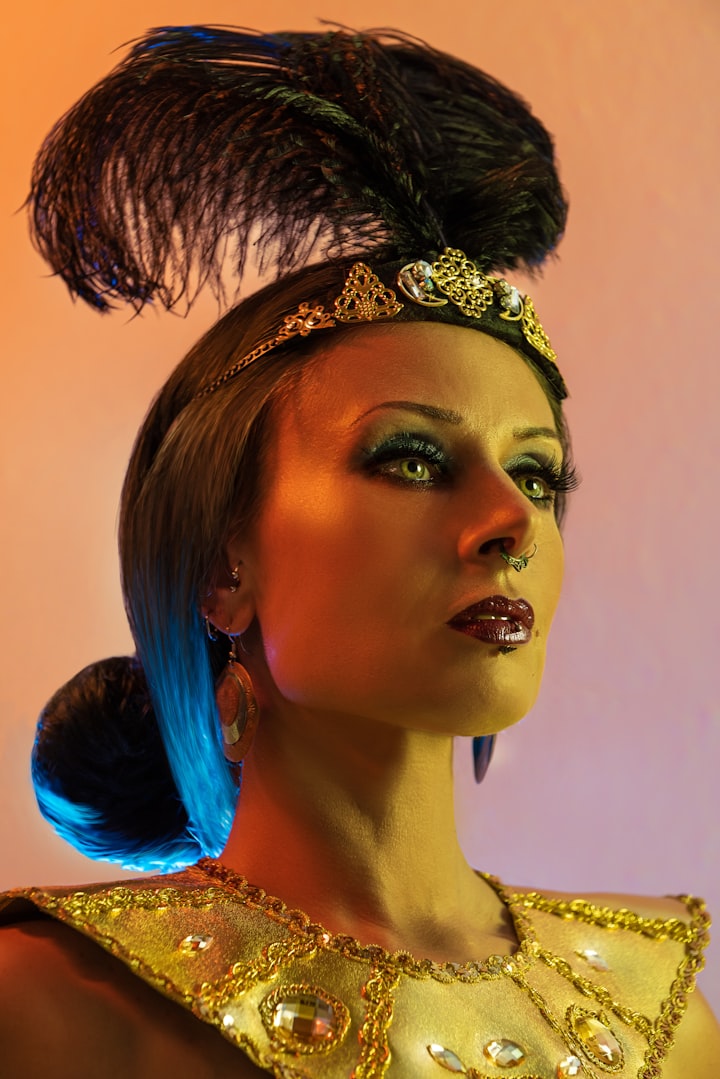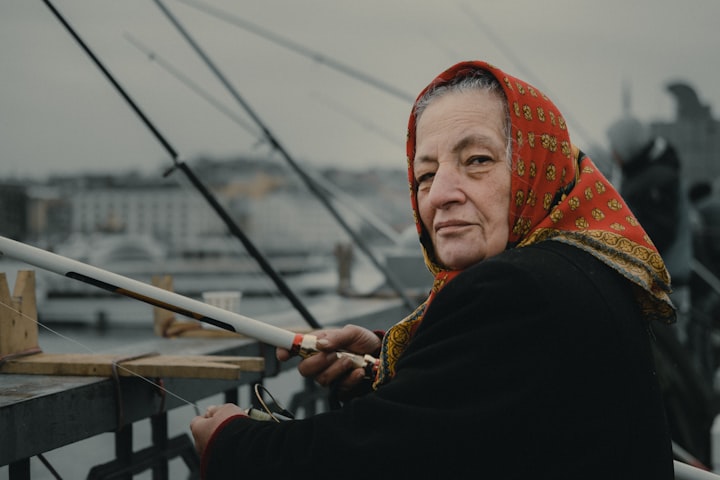The Allure of Egyptian Eyes
A mysterious woman enchants passengers and leaves a trail of mystery
She was beautiful, extraordinarily so.
“Everyone remarked upon it,” I said.
“Everyone,” he repeated but ended the word with the slightest upward lilt so that it might be taken as a question.
“All who recalled her,” I clarified.
I heard behind me the scratching of his pen against paper, writing down my words in his notebook.
It seemed almost indecent to be lying down in such close proximity to this strange man. But my brother assured me the doctor’s reputation was nothing less than professional.
It was he who’d suggested I take the talking cure. I can’t say that I fully believed in its curative powers but I agreed to at least give it a try. The tincture my regular physician prescribed had done nothing for my nerves.
“She had jet black hair as straight and shiny as a satin sash,” I said. “And her eyes! Almond-shaped, green as a cat's, and lined with kohl, a custom where she was from.”
“Where she was from,” he repeated, again with the upward lilt.
“Near Cairo,” I said.
“Egypt?”
A real question that time.
“Yes, Egypt,” I said. “A journalist on board later wrote that the woman’s winter home was not far from the great pyramids. Her family bred Arabian horses and she used to ride her favorite stallion around the pyramids as a child. Or so he wrote.”
“You doubt his accuracy?” the doctor asked.
“He is a reputable journalist,” I said.
I adjusted a hairpin that was poking my scalp. A stray auburn strand coiled softly against my cheek. I brushed it back.
“And her skin! Absolutely exquisite! The color of a proper Melange at the Cafe Sperl,” I said.
“A coffee drink?” he asked.
“Yes, blended by half with cream,” I said.
How could he call himself Viennese and not know the city’s most famous cafe most famous beverage? Such an odd duck, this doctor.
He didn’t respond. I presumed he was writing again. Or simply waiting for me to fill the silence.
I took my time, took in the room. My latest chapeau hung near the door on a worn and dated hatrack that even in its prime was never of particularly good quality. The furnishings in the doctor’s study left much to be desired.
I fingered the ivory embroidery of my summer frock. Each silk thread used on the bodice was as fine as a single human hair. The only woman in Austria capable of such delicate handiwork had gone blind a few years prior, the cost of her craft.
I pressed the fleshy pad of my middle finger into a delicate white silk rose, then watched its impression bloom within the swirl of my fingerprint.
“You are interested in your hands,” he said.
“I suppose I am,” I said turning my palm to inspect the length of my lifeline, the break in my love line.
I sometimes forgot he could see me lying there on his fainting couch, as though overcome by the vapors. And perhaps I required smelling salts, metaphorically speaking, to revive me from the faint twilight that had become my life.
Neither one of us spoke. I noted the detail of the ceiling medallion, more grand than the modern light it now surrounded. A plaster fleur de lis on one side had cracked and broken off, perhaps the result of a careless servant replacing an electric lightbulb. Were a bit of plaster to rain down upon me where I lay, would it cause harm? I wondered and closed my eyes. I became aware of the ticking of the mantel clock, those delicate black hands measuring my life in seconds.
“She wore a gold gown,” I continued.
“On that night?”
That night, such an innocuous euphemism for such a pivotal moment, pivotal not only in my life but also in the lives of others, in the deaths of others, that night when the ship went down.
“No,” I said, “the evening of the masquerade ball, two days previous to that night.”
I smoothed my skirts and folded my hands over my waist, feeling the bones of my corset.
“She made her entrance unaccompanied by a gentleman,” I said, then added with a sly smile. “Unaccompanied by any man, gentle or not.
“She glided in gracefully, on her own, all eyes upon her as she descended each step of the grand staircase, men and women alike, watching her,” I said. “Guests gathered on the ballroom floor, parted without a word to allow her passage.
“She wore an unusual hat, a kind of headpiece I suppose, that sat low on her forehead and sparkled with what I presumed were glass gemstones — this was, remember, a costume party. But I overheard another passenger, who came from a family of jewelers, whisper to his wife that both the gold and gemstones were undoubtedly authentic.”
“Authentic,” the doctor said.
Why he was interested in the value of the jewels worn by a woman he’d never met, a woman he would never meet, was beyond me. He struck me as the type of man to buy costume jewelry for his wife if he even had a wife. I couldn’t imagine him married.
“She barely looked at the other passengers but focused only on me, stared directly at me, honestly.” I paused recollecting the moment. “The others noticed. I felt disconcerted. Perhaps my mask had slipped?”
The doctor cleared his throat.
“You had concerns your mask slipped to reveal your true self,” he said.
“Well, naturally,” I said. “It was a masquerade ball! We weren’t to unveil until the stroke of midnight.”
“I see,” he said.
“But my mask was properly in place,” I continued. “Mine was a papier-mache mask in the art nouveau style, lacquered red and embedded with rhinestones, held in place with a kind of Juliet cap of basketweave ribbon.”
“An elaborate mask,” he noted.
“Quite,” I said.
“So you think it was your mask that caught her eye,” he half-questioned.
“I cannot be sure.”
The ceiling needed freshening. Faint black marks from the heat of the electric light surrounded it like a dark halo, an angel in reverse.
“She crossed the room and walked toward me,” I said, my mouth suddenly dry in the remembering. “I raised my glass to quench my thirst when. . , “
“But your mask,” he said, as though catching me in a falsehood.
“What about my mask? Have you never attended a masquerade? Have you never? The masks leave eyes and mouths exposed, of course, so you can see and eat and drink,” I said. “It is a party, after all.”
“You can speak,” he said.
“Of course!” I said.
For a supposedly learned man, the doctor seemed woefully ignorant of high society. I imagine he was equally ignorant of all tiers of society.
“As I was saying, I was about to take a sip of my champagne when I looked around to see all the others in the room stood dumbstruck, drinks raised and forgotten on the way to their mouths,” I recalled with a slight laugh. “She had mesmerized us all.”
“But it was you she approached,” he reminded me.
“As she drew nearer, I thought what an otherworldly creature she looked, a goddess, ” I continued. “She moved as if liquid, her dress as molten gold. Extraordinary! The fabric poured over the curve of her waist, around the fullness of her breasts. She stood directly before me, so near I felt her warm breath against the skin of my cheek. She whispered in my ear.
“We stood so close I felt the fine silk of her gown against my own and a shiver, like an electrical current, ran through me and I . . ., ” I hesitated. I what? “I knew.”
“You knew what?” the doctor asked.
“I simply knew.”
“I see,” he said.
“Do you?” I suddenly sat up and turned to face him, something I’d not done before during any of our previous sessions.
He appeared taken aback. He clutched his notebook on his lap.
“Dr. Freud,” I said almost laughing. “You appear positively frightened of me.”
“Do I?”
“Terrified,” I said.
He seemed unsure how to respond. I allowed him to suffer in the social discomfort.
Then I turned back around and settled down again onto the settee. I didn’t care to look at him. He disrupted my thoughts.
"Did you read what Mr. Stead wrote of her? I asked.
“The journalist?”
“Did you know he was on board?”
“I did not.”
“He recently wrote a column about a curator, working with an unimportant museum in some God-forsaken spot in the middle states of America,” I said. “He reported that in the ship’s cargo was a sarcophagus and a trunk of Egyptian artifacts. The curator of a minor museum in the Americas had procured it at quite a price,” I continued. “How much, Mr. Stead did not say, but the implication was the goods were ill-gotten.”
“You suspect the beautiful woman of transporting stolen goods,” the doctor summarized.
“Heaven’s no,” I said.
“My apologies,” said the doctor. “I misunderstood.”
“You certainly did. The American curator was at fault, clearly,” I said. “The lesser collectors are notorious for purchasing plundered relics, some ignorantly, some knowingly. It’s not right, but it is what they can afford. Commerce and art make dreadful bedfellows.”
I heard a swoosh of his pen against his notebook, underlining words he considered important. It occurred to me that I could offer him help in procuring a painting for the North wall of his study. Or better yet, his sad ceiling! That could be quite amusing.
“He might have been arrested had he survived,” I said, “the museum curator.”
“He drowned,” the doctor said.
“Among the missing and presumed so,” I said. “Mr. Stead has made contact with him.”
“So the curator lives?”
“On the contrary, he’s quite dead,” I said.
Furious scribbling sounds behind me.
“Do you really not read Mr. Stead’s magazine articles,” I asked.
“I fear not.”
“He’s well known for his investigative writings on the mystical. He debunked the infamous Madame O, a charlatan who had thoroughly convinced a circle of English aristocrats she was channeling their ancestors. Mr. Stead revealed it all as utter nonsense. But not before the gullible lost literally thousands of pounds sterling in the sham,” I said. “Mr. Stead is, if not a man of science like yourself, one of healthy skepticism and the utmost integrity”
The doctor waited, seemingly unsure what this story had to do with that night on the ship.
“In his search for answers to precisely why the ship sank, Mr. Stead had the opportunity to attend a true seance conducted by a proven seer,” I said. “Much to his surprise, the lost American curator let it be known, through complex signaling of electric lights and knocks interpreted by the medium, that it was he, the curator, who was at fault. It seems the Egyptian mummy and artifacts he’d purchased were not the bargain he’d first presumed. The mummy, you see, carried a curse. On the crypt were words of warning that anyone who dared disturbed it would suffer the consequences. The American dismissed it all as superstition until the accident.”
“The ship?” the doctor asked.
“The ship,” I confirmed. “Mr. Stead did extensive research and discovered the stolen sarcophagus belonged to a princess who lived more than 2,000 years ago. Egyptologists had deciphered the hieroglyphs on the tomb which noted her line of royalty and her extraordinary beauty. Mr. Stead interviewed several scholars, all experts in their fields of study, who said the same. That’s when I contacted Mr. Stead.”
“I see,” said the doctor.
“As it turned out, he’d skipped the masquerade,” I said. “But he’d heard from other passengers who remembered the beautiful woman on board. Some recalled seeing her lounging in a deck chair under the moonlight. Another claimed he saw her walking a cat like a dog on a leash of gold. But for the entire four days, we were at sea, she spoke to no one.
“Except for the evening of the masquerade,” the doctor said. “So you are listening to me,” I said.
“I am,” he said.
“The night she brushed up against me, she whispered but one word in my ear ‘Ahmose,’” she said, “nothing more than ‘Ahmose.’
The doctor did not react. The word meant as much to him as it had meant to me that evening, which was nothing at all.
“The exquisite Egyptian princess entombed thousands of years ago,” I said with an upward lilt like a question. “Her name was Ahmose.”
About the Creator
Vivian R McInerny
A former daily newspaper journalist, now an independent writer of essays & fiction published in several lit anthologies. The Whole Hole Story children's book was published by Versify Houghton Mifflin Harcourt, 2021. More are forthcoming.
Reader insights
Nice work
Very well written. Keep up the good work!
Top insights
Excellent storytelling
Original narrative & well developed characters
Compelling and original writing
Creative use of language & vocab
Easy to read and follow
Well-structured & engaging content
Eye opening
Niche topic & fresh perspectives
On-point and relevant
Writing reflected the title & theme







Comments
There are no comments for this story
Be the first to respond and start the conversation.